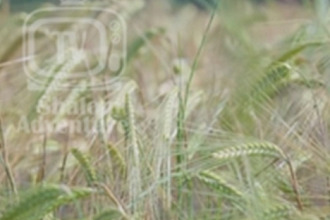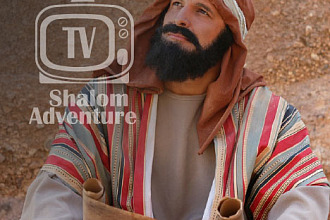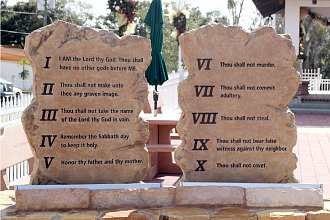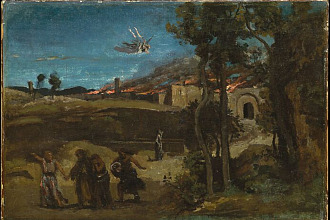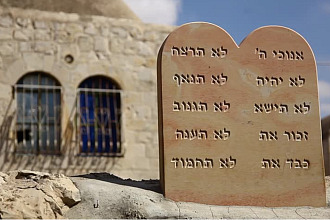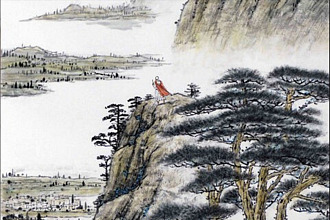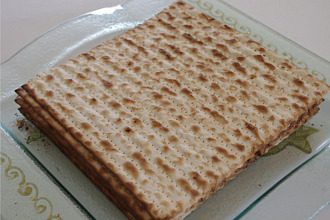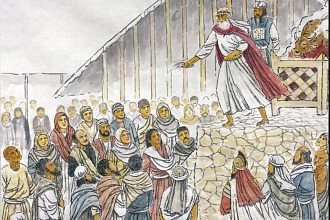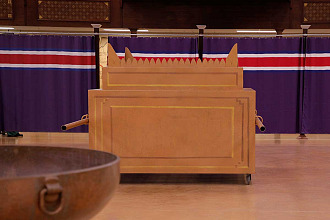Parasha for the Week: Va'etchanan: Deuteronomy 3:23 - 7:11.
Haftarah: Isaiah 40:1 – 20.
Besorat Yeshua: Mark 6:41 – 52.
Overview
Although Moshe is glad that Yehoshua will lead the nation, Moshe nevertheless prays to enter the Land of Israel in order to enjoy the promise land after the last forty years of hard work. Hashem refuses.
Moshe reminds Israel of the gathering at Sinai when they received the Torah—that they saw no visual representation of the Divine, but only the sound of words.
Moshe impresses on the people of Israel that the Sinai revelation took place before an entire nation, not to a select elite, and that only God's people will ever claim that Hashem spoke to their entire nation.
Moshe specifically enjoins Israel to "pass over" the Sinai event to their children throughout all generations.
Moshe predicts, accurately, that when the people dwell in the land of Israel they will sin and be scattered among all the peoples.
They will stay few in number but will eventually return to Hashem. Moshe designates three "refuge cities" to which an inadvertent killer may flee. Moshe repeats the Ten Commandments and then teaches the Shema, "Shema Israel Adonai, Elohenu, Adonai Echad", the central credo of Judaism, that there is only One G-d. Moshe warns the people not to succumb to materialism and thus forget their purpose as a spiritual nation. The parasha ends with Moshe exhorting Bnei Israel not to intermarry when they enter Eretz Israel, as they cannot be a treasured and holy nation if they intermarry, and they will become indistinguishable from the other nations.
"Moshe's Prayer"
Moshe wanted to enter the land of Israel, but the Almighty did not allow him to. The Torah states that Moshe said: "And I prayed to the Almighty at that time saying..." (Deuteronomy 3:23).
One of the Jewish ways of understanding the Torah is through gematria—examining the numerical values of words. What do we learn from the numerical value (515) of the first word of the verse, "Va'etchanan" ("and I prayed")?
The Sages tells us that Moshe prayed to the Almighty as many prayers as the numerical value of the va'etchanan—515 prayers. This shows us how strong Moshe's desire was to enter the Holy Land.
Let's picture this: If someone asks another person for something and the other person refuses to meet his request, it is possible that he will ask again. However, after a few times, he will give up. There is a limit to how many times one person will ask another for something. Here we see that Moshe continued to ask five hundred and fifteen times. This is truly amazing. We learn from this the principle that the way to success is through persistence. Especially in spiritual matters one needs to adopt this attitude.
There are three rules for success:
- Initiative—you have to try.
- Perseverance—you have to keep trying.
- The Almighty blesses your efforts.
Young children are the paradigm of persistence. (Ask any parent!) If something is important enough to you, you must persist in order to succeed.
Yeshua taught us about perseverance in prayer by giving a parable: "Then Yeshua told them a parable about their need to pray always and not to lose heart. He said, "In a certain city there was a judge who neither feared God nor had respect for people. In that city there was a widow who kept coming to him and saying, 'Grant me justice against my opponent.' For a while he refused; but later he said to himself, 'Though I have no fear of God and no respect for anyone, yet because this widow keeps bothering me, I will grant her justice, so that she may not wear me out by continually coming.'" And the Lord said, "Listen to what the unjust judge says. And will not God grant justice to his chosen ones who cry to him day and night? Will he delay long in helping them?" (Luke 18:1-7). The case of Moshe is very special. Because when we read this text we think that G-d did not answer positively to him even though he prayed 515 times on this same topic. However in fact. God answered him positively but his answer was - later. When we analyse the request of Moshe we understand that he wanted to enter the Promised Land or paradise after forty years of hard work. But the promised land of Canaan was not paradise. The work was not finished when they reached Jericho, the conquest of the land had just started. That's why G-d wanted to give a better answer to Moshe. He wanted to give him the real paradise. Then when it was time for Moshe to die, G-d said to him that nobody had to attend his death. "On that very day the LORD addressed Moses as follows: "Ascend this mountain of the Abarim, Mount Nebo, which is in the land of Moab, across from Jericho, and view the land of Canaan, which I am giving to the Israelites for a possession; you shall die there on the mountain that you ascend and shall be gathered to your kin, (Deut. 32:48-50) The reason is that Moshe had no need to be buried by human beings. Moshe died and was resurrected immediately to go to paradise. "Then Moses, the servant of the LORD, died there in the land of Moab, at the LORD'S command. He was buried in a valley in the land of Moab, opposite Beth-peor, but no one knows his burial place to this day." (Deut. 34:5-6). The Brit Hachadasha helps us to understand a very important point about the death of Moshe. We learned that the very special angel called Mikael came to take Moshe to heaven, even though Satan was not happy. "But when the archangel Mikael contended with the devil and disputed about the body of Moses, he did not dare to bring a condemnation of slander against him, but said, "The Lord rebuke you!" (Jude 9). Then Moshe finally got what he was asking for in his prayer. Eternal rest in heaven in the presence of God and a very few human beings such as Enoch who did not die (Gen. 5:24) and later they were joined by Elijah the prophet who did not die either (2Kings 2:11). That is why on the day of the transfiguration of Yeshua we see Moses and Elijah speaking with the Messiah about his death.
"Gratefulness Towards Him"
The Torah records that the Almighty said about the Israelites: "Who will ensure that the heart that you have now will continue to fear Me and to observe all of My commandments all the days, in order to do good for you and your children forever." (Deut. 5:26)
The Talmud (Avodah Zarah 5a) states that Moshe said to the Israelites, "You are ungrateful (because they didn't ask the Almighty to ensure that their hearts continue to fear Him) and the descendants of someone who is ungrateful (Adam complained that the woman the Almighty gave to him caused him to eat from the fruit of the Tree of Knowledge).
Tosfos explains that they didn't want to ask the Almighty to give them this elevated heart because they didn't want to feel grateful towards Him. This teaches us two concepts about gratitude:
- Whenever you complain about what the Almighty has given you - it shows a lack of gratitude.
- People will try to avoid feeling grateful. They don't want to be beholden -they think it lowers their self-esteem.
In relationships - particularly with our spouse - we must show gratitude. It not only is an elevated character trait, but it builds a closeness when one recognizes the good one has received.
"Beyond Good and Love"
The Torah states, "And you shall do that which is right and good in the sight of the Lord" (Deuteronomy 6:18). What does this verse come to teach us?
The Ramban, Nachmanides, cites the words of our Sages who explain that this verse exhorts us to go beyond the dictates of the law in our dealings with our fellow man. The Ramban adds that this is a very great principle, since it is impossible for the Torah to actually list every last detail as to how a person should behave with his neighbors and friends. An example: The owner of a plot of land should offer it first for sale to adjacent land owners before offering it for sale to the general public.
"Shema Yisrael"
In this week's Parsha we find the "Sh'ema" - "Hear O' Israel the L-rd is Our G-d the L-rd is one. And you shall love the L-rd your G-d with all your heart and with all your soul and with all your might ("B'chol M'odecha")." The Sh'ema prayer is recited three times daily as we affirm our belief in G-d and our love for Him.
The words "B'chol M'odecha" - ("with all your might") can also be translated, "with every measure." Meaning, that even if G-d acts with us in a measure that may not seem good, we must love Him just the same.
"Our Generosity?"
Two Russian peasants were sitting and discussing their loyalty to the Czar. Said one of them: "My loyalty to the Czar has no bounds." "What if you owned two houses, would you give one to the Czar?" Pondered his friend. "Sure I would," replied the first without hesitation. "What if you owned two cows, would you give one to the Czar?" Again his friend replied in the affirmative.
"What if you had two chickens, would you give up one for the Czar?" "This I couldn't do!" replied the first peasant.
"But why is a chicken different than a house and a cow?"
"There is a big difference... two chickens I do happen to own!
Haftarah: Isaiah 40:1 - 20
This Shabbat is the first Shabbat after Tisha B'Av. It is called, "Shabbat Nachmu" ("Shabbat of comfort"), as the Haftarah of this week begins with the words "Nachmu Nachmu Ami" –
"Comfort, comfort, my people." There are seven weeks from Tisha B'Av until Rosh Hashana. This period is called, "Shiva D'nechemta"—"Seven weeks of comfort." These seven Haftarot are prophesies of comfort and hope for Israel and God's people at large.
Haftara: The root of the Hebrew word for comfort "Nachem", nun-chet-mem can refer to comforting the nation as well as to comforting an individual after the death of a loved one.
If the people of Israel are to be comforted, it is because the Lord is coming very soon. The text says, A voice rings out: "Clear in the desert a road for the LORD! Level in the wilderness a highway for our God! Let every valley be raised, every hill and mount made low. Let the rugged ground become level and the ridges become a plain. The Presence of the LORD shall appear, and all flesh, as one, shall behold — For the LORD Himself has spoken" (Is. 40:3-5 JPS).
It is interesting to notice that the Brit Hachadasha, which is an interpretation made 2000 years ago applied this text to the coming of the Mashiach. "This is the one of whom the prophet Isaiah spoke when he said, "The voice of one crying out in the wilderness: 'Prepare the way of the Lord, make his paths straight'" (Matt. 3:3). Matatyahu spoke about Yochanan HaMatbil who prepared the way of Yeshua in the desert near Jericho. What is interesting is that the brit Hachadasha did not apply verse 5, 'The Presence of the LORD shall appear, And all flesh, as one, shall behold,' (JPS) to Yochanan because this part of the verse will be applicable only at the end of time for the definitive presence or coming of the Mashiach, what we call the Second Coming of the Mashiach. Then all flesh (from everywhere in the world) shall behold.
Then we will see the real comfort and consolation of Israel. As it is written, "That her iniquity is expiated; for she has received at the hand of the LORD double for all her sins" (Is. 40:2). They have been pardoned for all their sins and they will enjoy eternal rest. Our mission today is to comfort Israel and to prepare Jerusalem for that great day, "Nachmu Nachmu Ami" - "Comfort, comfort, my people" (Isaiah 40:1).
Besorat Yeshua: Mark 6:41 – 52
In our text of the Besorah, Yeshua not only taught the crowds and worked as a prophet, but he comforted the people by providing food. "Taking the five loaves and the two fish, he looked up to heaven, and blessed and broke the loaves, and gave them to his disciples to set before the people; and he divided the two fish among them all" (Mark 6:41). Yeshua is the new Moses, the one who was announced by Moses. Exactly as Moses gave bread from heaven, Yeshua also gave bread, but in addition to bread, Yeshua also shared fish among all these people who numbered about 5,000 people. They were all filled which means there was more food than was needed, and the rest, twelve baskets full which could be used later, was collected. This number is a reference to the twelve tribes of Israel who were fed by Moses and G-d and also to the twelve talmidim of Yeshua who also were fed and became instruments of G-d for giving more spiritual food to the people of Israel. We remember that Moses said, "In order to teach you that man does not live on bread alone, but that man may live on anything that the LORD decrees" (Deut 8:3 JPS). Yeshua did one more thing; he saw the condition of his talmidim. Working days and nights with the Mashiach, they were tired from all the work. That is why Yeshua wanted to comfort them, "Nachmu Nachmu Ami". "Immediately, He made his disciples get into the boat and go..." (Mark 6:46). Yeshua cares for his people; he comforts and helps them to get rest. Only after all this work did he decide to have a close relationship with our father in heaven, His Father. "After saying farewell to them, he went up on the mountain to pray" (47). The disciples did not get rest though; they were on the sea and once again Yeshua went to comfort them (cf. 47-52).



